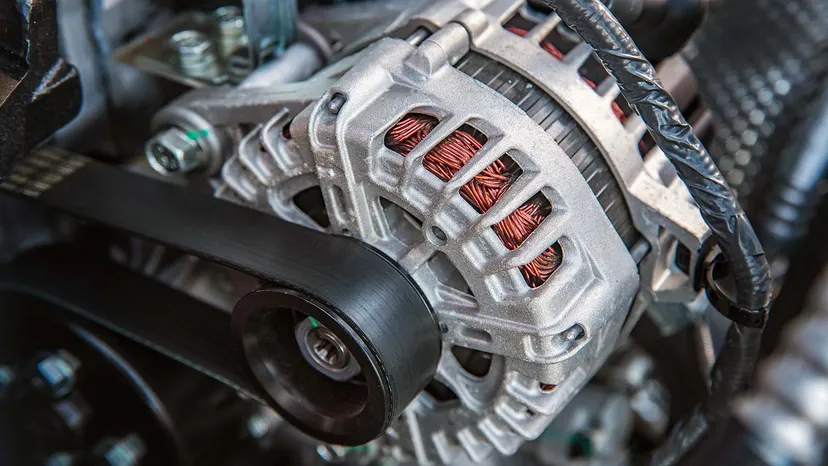
The Essential Role of Alternators in Modern Vehicles
Introduction to Alternators
Alternators are fundamental components of modern vehicles, crucial in maintaining the electrical systems. Responsible for converting mechanical energy to electrical energy, alternators ensure that batteries are charged and electrical components function smoothly. Without them, vital systems such as headlights, air conditioning, and ignition wouldn’t operate efficiently.
Initially integrated into vehicles in the 1960s, alternators have evolved to become more efficient and reliable. This evolution has significantly improved automobiles’ overall performance and reliability, making them indispensable in today’s automotive industry. Over the decades, technological advancements have increased their efficiency, making modern vehicles more dependable and energy-efficient.
How Alternators Work
Alternators channel mechanical energy from the engine into electrical energy through electromechanical conversion. A belt-driven pulley produces alternating current (AC), which is later transformed into direct current (DC) with an included rectifier. This direct current charges the battery and supplies power to the car’s electrical components, such as entertainment, lights, and navigation devices.
One key component, the voltage regulator, ensures that the electrical output is consistent and sufficient to meet the vehicle’s demands. This component prevents overcharging or undercharging, protecting the alternator and the electrical systems. Without a voltage regulator, electrical surges could damage expensive vehicle components.
This resource provides detailed information on automotive electrical systems and their integral role in vehicle functionality. Learn more about them in this resource.
The Lifespan of an Alternator
On average, an alternator’s lifespan ranges from 80,000 to 150,000 miles, or about 7-10 years, depending on driving conditions and maintenance practices. However, factors like the driving environment, electrical load, and quality of the alternator can significantly impact its longevity. For instance, frequent short trips can cause more wear and tear on the alternator than long highway driving.
Regular maintenance and timely inspections can extend the life of an alternator and starters, preventing unexpected breakdowns and costly repairs. Checking the drive belt’s condition and securing electrical connections can significantly impact the alternator’s performance and longevity.
Common Signs of Alternator Failure
Identifying the initial indicators of alternator malfunction can prevent you from being stuck with a drained battery. Common indicators include:
- Dimming headlights or interior lights
- Electrical issues like faulty power windows or stereo systems
- Strange noises, such as grinding or whining
- Frequent dead battery despite proper maintenance
Addressing these issues promptly can prevent further damage to your vehicle. Diagnosing and fixing these problems early is essential to avoid being caught off guard. Regular vehicle checkups can help catch these signs early.
Need more insights on vehicle symptoms? Check out common vehicle symptoms and their meanings. This article provides helpful advice on identifying and troubleshooting various car issues, ensuring your vehicle remains in good working order.
Replacing Your Alternator: What to Know
Knowing the procedure can assist you in making educated choices when the moment comes to replace your alternator. Here are the steps involved:
- Disconnect the battery to prevent electrical shocks.
- Take off the drive belt by releasing the tensioner.
- Disconnect the electrical connections and mounting bolts from the alternator.
- Install the new alternator by reversing the removal process.
Although some people with mechanical skills may be able to replace an alternator themselves, it is often advised to get help from a professional to ensure it is installed correctly. Costs can vary based on labor and the quality of replacement parts. A professional installation can also include a warranty, providing added peace of mind.
Tips for Maintaining a Healthy Alternator
To keep your alternator in top condition, consider these maintenance tips:
- Regularly inspect and replace the drive belt if needed. A worn or loose belt can reduce the alternator’s efficiency.
- Ensure electrical connections are clean and tight. Corroded connections can impede electrical flow.
- Maintain a healthy battery, as a weak battery can overwork the alternator. Regularly check the battery to make sure it maintains a reasonable charge.
- Check for signs of corrosion or damage periodically. Rust and dirt can affect performance.
Seasonal inspections and routine maintenance can significantly extend the life of your alternator and improve overall vehicle performance. Regular checkups by a professional mechanic can identify potential issues before they become significant problems.
Expert Advice on Choosing the Right Alternator
When selecting a new alternator, consider the following factors:
- Compatibility with your vehicle’s make and model. Using the correct alternator ensures proper fit and function.
- Reputation and reliability of the brand. Trusted brands often provide higher quality and better warranties.
- Cost-effectiveness and warranty options. Spending a bit extra at the beginning can result in eventual cost savings.
Professional opinions often favor OEM (Original Equipment Manufacturer) parts for their guaranteed fit and quality. However, high-quality aftermarket options can also offer excellent performance at a lower cost. Consult with trusted mechanics or automotive experts to choose your needs best. Always read reviews and customer feedback to gauge the reliability of the alternator you plan to purchase.
Future Trends in Alternator Technology
Innovations in alternator technology are paving the way for more efficient and versatile systems. Advanced designs are being integrated into electric and hybrid vehicles, enhancing energy recovery and reducing emissions. These advancements promise a future where alternators will play an integral role in sustainable automotive technology. New materials and designs make alternators lighter, more efficient, and more durable.
With continuous research and development, the future of alternator technology looks promising. It will make our vehicles more reliable and eco-friendly than ever before. As automotive technology evolves, alternators will become even more sophisticated, contributing to the overall advancement of vehicle performance and sustainability.



